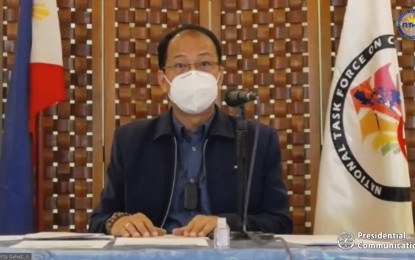
National Policy against Covid-19 chief implementer and Presidential Peace Adviser Secretary Carlito Galvez Jr. (Screengrabbed RTVM)
MANILA – National Policy against Covid-19 chief implementer, Secretary Carlito Galvez Jr., on Thursday said active cases are gradually decreasing with the government's efforts to curb the spread of the coronavirus disease (Covid-19).
In a virtual press briefing, Galvez said the recorded 88,000 active cases on August 15, which he attributed as the highest surge of Covid-19, have dropped to only 46,000.
In Metro Manila, he said, the recorded 20,000 active cases in September were reduced to only 7,830 active cases.
"Meaning from 20 percent active cases, now, it’s only 6 percent of the active cases," he said.
Galvez noted that there is a "negative growth" of Covid-19 cases within Metro Manila.
He also reported that some 12 cities have recorded 90 percent of Covid-19 recoveries.
Expanded pandemic response
As per the recommendation of experts, Galvez said the government commits to strictly enforce the so-called seven commandments for all public transportation which include wearing of proper face masks, wearing of face shields, no talking and eating policy, provision of adequate ventilation, frequent disinfection, disallowing symptomatic passengers as well as strict observance of physical distancing measures.
Galvez cited that observance of physical distancing is vital in sustaining gains against Covid-19.
He said the government will still implement the Prevent-Detect-Isolate-Treat-Recovery strategy under the third phase of the national action plan (NAP 3).
Galvez said the NAP 3 will serve as the country's transition plan going to the new normal.
"We will emphasize more on the prevention and detection side," he said.
He added that the government's "Ingat Buhay Para sa Hanapbuhay" along with the private sector's "Ingat Angat Tayong Lahat" have provided good traction in the country's prevention strategy drive.
Under the detection strategy, Galvez said the government established Covid-19 Coordinated Operations to Defeat Epidemic (CODE) team at the barangay level to maintain active case finding and syndromic surveillance.
They are tasked to immediately separate the symptomatic individuals away from the community, even without testing for Covid-19.
The government, meanwhile, will strictly impose the expanded Oplan Kalinga, which disallows anyone to undergo home quarantine.
"We are encouraging coronavirus patients to avoid home quarantine," Galvez said.
Under the treatment strategy, Galvez said the government will intensify the 'One Hospital Command' policy while strengthening the quarantine measures and minimum health standards in all business establishments and workplaces.
"Our strategy is to open up our economy, to provide sufficient transportation for workers while ensuring health and safety our fellow citizens," he said.
The government seeks to establish strong links and partnerships among LGUs, the private sector, and other stakeholders in a bid to intensify the country's responses to the pandemic.
He said the national government targets to further institutionalize the pandemic response down to the cities, municipalities, and at the barangay level.
The One Hospital Command referral system will be replicated in all regional levels along with the LGUs, health professionals, the business sector, religious and key stakeholders that are working together within the Covid-19 one-stop-shop center, he added.
"We will carry out aggressive contact tracing, testing, treatment, and isolation measures so that we can bring down our active cases to the lowest manageable percentage," Galvez said.
Ways forward
Galvez earlier said political bickering in some LGUs has affected the imposition of pandemic interventions and other efforts to curve the spread of the Covid-19.
"We bridge political division through the unity of efforts and unity of command process," he said.
The National Task Force on Covid-19, Galvez said, has been encouraging local leaders to set aside differences to perform well amid the pandemic.
Galvez said the government targets to reduce active cases and minimize deaths while increasing the recovery rate.
"With all of this, I am confident, we can further reduce the transmission, gradually bring our vibrant economy back as we transitioned to the new normal," said Galvez.
On the other hand, Galvez admitted that the Philippine Red Cross (PRC) has a significant part in the country's testing capacity.
Galvez thanked the PRC for its contribution to further expand the country's testing capacity and effective handling of the country's one-stop shops for returning OFWs and seafarers.
He noted that the government is still trying to resolve the matter between PRC and the Philippine Health Insurance Corp. (PhilHealth).
Galvez said Dante Gierran, the newly appointed PhilHealth chief, would just "want to make sure that all of this is in order."
"I believed that the major consequence of the Red Cross' stoppage is stemmed to those returning OFWs," Galvez said, in the light of the issue wherein the PRC halted the coronavirus tests that are being charged to the PhilHealth.
Those Covid-19 test samples — deemed affected by the PRC's stoppage, would temporarily be delivered to the government's testing facilities, Galvez said, while PhilHealth is settling the matter with the PRC.
He said LGUs also have laboratories to accept tests for the first and second contacts of the Covid-19 patients, following the decision of the PRC to stop testing the specimen of returning OFWs, those arriving in airports and seaports, those in mega swabbing facilities, and frontline health and government workers. (PNA)
